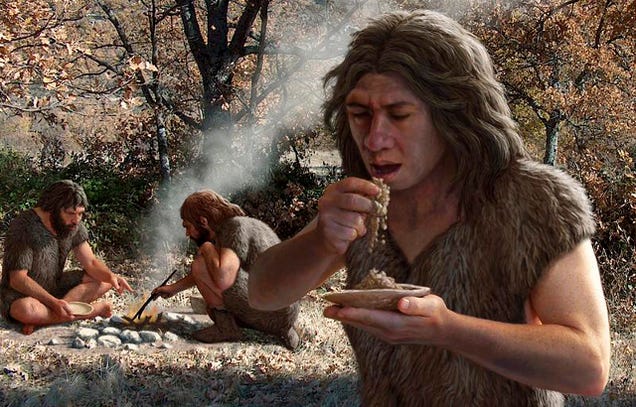
Anthropologists
have had great difficulty trying to figure out what Neanderthals ate.
It's an important question because it may have had a direct bearing on
their eventual extinction. One theory holds that Neanderthals may have
died out owing to an exclusively carnivorous diet, while modern humans
thrived by adopting a complex diet rich in animal protein and plants.
Previous archaeological finds reaffirmed the notion that Neanderthals did in fact eat meat (including shellfish), leading anthropologists to surmise that they were top-level carnivores. A 2010 analysis
of Neanderthal teeth and scattered botanical evidence did however
suggest a certain degree of plant-eating among the Neanderthals, but no
"smoking gun" has ever been found to definitely prove an omnivorous
diet.
According
to paleoanthropologist Ainara Sistiaga and her team, that smoking gun
has now been found — and it's a pile of 50,000-year-old crap.
Chemical Traces
The
ancient excrement was found at the El Salt dig in Spain, a Middle
Paleolithic site. It's considered the oldest positive identification of
human faecal matter, significantly predating those found in Egyptian
mummies and ancient Greek latrines.
The
samples, which were found near an ancient campfire, were put through a
gas chromatograph to separate the individual chemical elements. Along
with mass spectrometry, the researchers were able to figure out which
molecules were present and in what quantities. The identification of
sterols and stanols was key — lipids known to be relatively stable
through food chains and during early digestive processes. What's more,
the discovery of plant-derived esters in the faecal remains suggested a
significant intake of plants.
Good Paleo Eating
Based
on the history of the region, it's likely that these particular
Neanderthals had a diet consisting of meat, berries, nuts, and root
vegetables — a list of foods very familiar to those who are currently on
the paleo diet. Of course, this doesn't necessarily imply an optimized diet,
but it's fair to say their digestive systems, after tens of thousands
of years of evolution, were very well adapted to these particular foods.
Make of that what you will.
The researchers conclude:
Taken together, these data suggest that the Neanderthals from El Salt consumed both meat and vegetables, in agreement with recent hypotheses based on indirect evidence. Future studies in Middle Palaeolithic sites using the faecal biomarker approach will help clarify the nature, role and proportion of the plant component in the Neanderthal diet, and allow us to assess whether our results reflect occasional consumption or can be representative of their staple diet. Also, this data represents the oldest positive identification of human faecal matter, in a molecular level, using organic geochemical methods.
Indeed, an important next step will be to figure out if Neanderthals from other European locations also consumed plants.

No comments:
Post a Comment